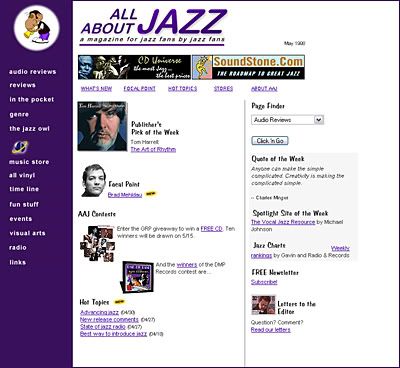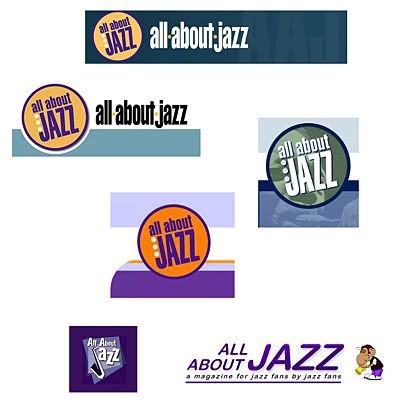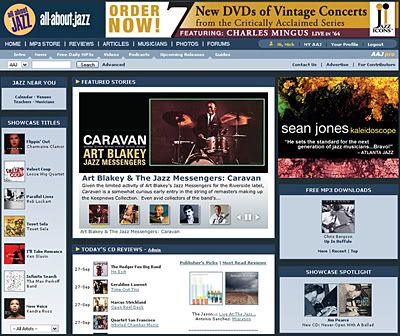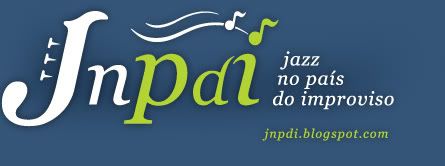Michael Ricci: a alma do AllAboutJazz

Em 1995, longe das luzes da ribalta e quando o papel é que ainda mandava na informação, arrancava nos EUA um site exclusivamente dedicado ao Jazz. JNPDI! entrevistou Michael Ricci, um dos fundadores do AllAboutJazz, o espaço de referência do "som da surpresa" na internet. Aqui fica, pois, "tudo" sobre o sítio que tem quase tudo o que se passa no jazz e onde semanalmente são publicadas 2/3 entrevistas com os seus principais protagonistas.
JNPDI!: When was the AllAboutJazz website launched?
Michael Ricci: Back in late 1995, though we didn't publish content like CD reviews and book reviews until late 1996.
JNPDI!: I know it is a site produced by jazz fans for jazz fans, but who really initiated it and currently manages it? Looking at the AAJ contributors guidelines I clearly assume some of the founders and editors have considerable experience in journalism. Is that correct?
MR: AAJ is still powered by a small army of volunteers, many of which have considerable experience with jazz journalism, editing, and technology. The senior staff has been instrumental in the site's success over the years, and Nils Jacobson, AAJ's former managing editor was responsible for shaping the editorial and submission guidelines.
Like most web start-ups back in 1995, it was launched as a hobby. I've always been a fan and collector of jazz, so I figured it would be a fun way to spend my free time. The web was wide open back in the day, so if you had a passion for a particular subject and had some technical skills, you could carve out a niche.
I didn't have a grand plan, though I had an idea of what I thought the site could become and have since established the building blocks over the last 12 years to get there. I'm fortunate to have a background in technology and my partner, Mike Lorenz, is also a programmer, so we were able to design a scalable database and supporting system.

Página inicial do AAJ em 1998. Imagem cedida por AAJ.
JNPDI!: Any of the people currently working for AAJ are exclusively dedicated to it professionally?
MR: You mean besides myself? :-) Our senior staff, in particular John Kelman, puts in an inordinate amount of time editing and writing. Most contributors have day jobs and pitch in when they can. I'm very lucky to have attracted smart, creative and totally committed people. Most are aware of the site's direction and are in it for the long haul.
JNPDI!: How difficult was it at the beginning to gain the respect and collaboration from record labels and musicians?
MR: Good question. In some regards the site still doesn't receive the respect it deserves. The jazz industry in general have been late adopters to technology and slower to grasp how the web can serve them. Recently, and I'm talking the last three or so years, things have changed. The site has established a good relationship with nearly all the labels, and with the development of a number of free professional services, musicians, publicists, presenters and educators are all buying in and using the site on a regular basis.
JNPDI!: How surprising has AAJ's development been? Do you have any figures that show its growth?
MR: AAJ has been around for 12 years and our traffic growth has been steady. We've never had an eye-popping spike, though traffic has increased at a much faster rate over the last two years. Still, I do remember the days when we'd have 2-3 visitors and I thought that was great.
"AAJ is a jazz advocacy site.

Em 1995, longe das luzes da ribalta e quando o papel é que ainda mandava na informação, arrancava nos EUA um site exclusivamente dedicado ao Jazz. JNPDI! entrevistou Michael Ricci, um dos fundadores do AllAboutJazz, o espaço de referência do "som da surpresa" na internet. Aqui fica, pois, "tudo" sobre o sítio que tem quase tudo o que se passa no jazz e onde semanalmente são publicadas 2/3 entrevistas com os seus principais protagonistas.
JNPDI!: When was the AllAboutJazz website launched?
Michael Ricci: Back in late 1995, though we didn't publish content like CD reviews and book reviews until late 1996.
JNPDI!: I know it is a site produced by jazz fans for jazz fans, but who really initiated it and currently manages it? Looking at the AAJ contributors guidelines I clearly assume some of the founders and editors have considerable experience in journalism. Is that correct?
MR: AAJ is still powered by a small army of volunteers, many of which have considerable experience with jazz journalism, editing, and technology. The senior staff has been instrumental in the site's success over the years, and Nils Jacobson, AAJ's former managing editor was responsible for shaping the editorial and submission guidelines.
Like most web start-ups back in 1995, it was launched as a hobby. I've always been a fan and collector of jazz, so I figured it would be a fun way to spend my free time. The web was wide open back in the day, so if you had a passion for a particular subject and had some technical skills, you could carve out a niche.
I didn't have a grand plan, though I had an idea of what I thought the site could become and have since established the building blocks over the last 12 years to get there. I'm fortunate to have a background in technology and my partner, Mike Lorenz, is also a programmer, so we were able to design a scalable database and supporting system.

Página inicial do AAJ em 1998. Imagem cedida por AAJ.
JNPDI!: Any of the people currently working for AAJ are exclusively dedicated to it professionally?
MR: You mean besides myself? :-) Our senior staff, in particular John Kelman, puts in an inordinate amount of time editing and writing. Most contributors have day jobs and pitch in when they can. I'm very lucky to have attracted smart, creative and totally committed people. Most are aware of the site's direction and are in it for the long haul.
JNPDI!: How difficult was it at the beginning to gain the respect and collaboration from record labels and musicians?
MR: Good question. In some regards the site still doesn't receive the respect it deserves. The jazz industry in general have been late adopters to technology and slower to grasp how the web can serve them. Recently, and I'm talking the last three or so years, things have changed. The site has established a good relationship with nearly all the labels, and with the development of a number of free professional services, musicians, publicists, presenters and educators are all buying in and using the site on a regular basis.
JNPDI!: How surprising has AAJ's development been? Do you have any figures that show its growth?
MR: AAJ has been around for 12 years and our traffic growth has been steady. We've never had an eye-popping spike, though traffic has increased at a much faster rate over the last two years. Still, I do remember the days when we'd have 2-3 visitors and I thought that was great.
"AAJ is a jazz advocacy site.
We're leveraging evolving technologies
with our growing readership to make
a difference in jazz".
JNPDI!: What milestones can we find in AAJ history so far?
MR: The day we automated our publishing system was a huge accomplishment. Up until that point, I produced the pages manually. Creating pages and links for 200+ reviews and another 60 articles took an insane amount of time. MY AAJ, the regional calendar of events, the Musician Center, and the Download Store were all major achievements. Overcoming the hack and crash in 2003 (where we lost five months worth of data) was also a turning point for the site. We were down for two months, but we came back stronger than ever.

Evolução do logotipo do AAJ. Imagem cedida por AAJ.
JNPDI!: There is an AAJ based in Italy. How did that happen? Is it a kind of a franchise? Are we to see more local AAJ sites in other countries and languages?
MR: Only AAJ:Italy to date, though a Australian version has appeal. Foreign language sites have their own set of challenges, so I'm not sure I have the energy for another.
Several years ago I was approached by Luigi Santasuoso who along with a band of jazz writers decided to leave MusicBoom to start a dedicated Italian jazz website. AAJ:US was making headway and had an infrastructure in place to accommodate him, so when he told me about the "mutiny", I asked him about the AAJ:Italia idea. He agreed and he's been publishing ever since.
JNPDI!: I think one of the key factors in AAJ's success are its contributors. Who are these people and what is their background?
MR: It's true. AAJ has attracted some exceptional people over the years. They're also knowledgeable about jazz. They care about the music and want to see it succeed. People join the staff and make their imprint for all the right reasons and I think it shows.
Whether it's the senior editors like John Kelman, Chris May, or Sam Chell or outstanding writers like Paul Olson, R.J. DeLuke, Jason Crane, Jack Bowers, Troy Collins, and Budd Kopman, AAJ attracts contributors from all around the world. Many differ in background, but they all have a common thread, and that's the love of the music.
MR: The day we automated our publishing system was a huge accomplishment. Up until that point, I produced the pages manually. Creating pages and links for 200+ reviews and another 60 articles took an insane amount of time. MY AAJ, the regional calendar of events, the Musician Center, and the Download Store were all major achievements. Overcoming the hack and crash in 2003 (where we lost five months worth of data) was also a turning point for the site. We were down for two months, but we came back stronger than ever.

Evolução do logotipo do AAJ. Imagem cedida por AAJ.
JNPDI!: There is an AAJ based in Italy. How did that happen? Is it a kind of a franchise? Are we to see more local AAJ sites in other countries and languages?
MR: Only AAJ:Italy to date, though a Australian version has appeal. Foreign language sites have their own set of challenges, so I'm not sure I have the energy for another.
Several years ago I was approached by Luigi Santasuoso who along with a band of jazz writers decided to leave MusicBoom to start a dedicated Italian jazz website. AAJ:US was making headway and had an infrastructure in place to accommodate him, so when he told me about the "mutiny", I asked him about the AAJ:Italia idea. He agreed and he's been publishing ever since.
JNPDI!: I think one of the key factors in AAJ's success are its contributors. Who are these people and what is their background?
MR: It's true. AAJ has attracted some exceptional people over the years. They're also knowledgeable about jazz. They care about the music and want to see it succeed. People join the staff and make their imprint for all the right reasons and I think it shows.
Whether it's the senior editors like John Kelman, Chris May, or Sam Chell or outstanding writers like Paul Olson, R.J. DeLuke, Jason Crane, Jack Bowers, Troy Collins, and Budd Kopman, AAJ attracts contributors from all around the world. Many differ in background, but they all have a common thread, and that's the love of the music.
JNPDI!: What is AAJ today?
MR: AAJ is a jazz advocacy site. We're leveraging evolving technologies with our growing readership to make a difference in jazz. Though I'm sure if you asked a reader, a musician, a publicist, an educator, and a presenter the same question, you'd get five different answers.

Página actual do site AAJ. Imagem cedida por AAJ.
MR: AAJ is a jazz advocacy site. We're leveraging evolving technologies with our growing readership to make a difference in jazz. Though I'm sure if you asked a reader, a musician, a publicist, an educator, and a presenter the same question, you'd get five different answers.

Página actual do site AAJ. Imagem cedida por AAJ.
JNPDI!: Where in your opinion will jazz fans be reading news about jazz in 10 years? Paper or digital media?
MR: My crystal ball isn't reliable beyond three years. The print market is shrinking, but as long as it's profitable, I'm not sure why it would go away. I hope that with AAJ:Mobile and all the other initiatives we're working on, All About Jazz will play some sort of role in the distribution of jazz news for many years to come.
JNPDI!: Where do you expect AAJ to be in the near future? Are we to see AAJ as the pivotal element of a jazz media group with magazines, books etc?
MR: The AAJ:Mobile service is coming, we're ramping up our download store, we've partnered to sell physical CDs, a ticketing store is in the works, and video integration is just a matter of time. Producing a television program and broadcasting concerts at the site have a lot of appeal. We have plenty of ideas, but we still have much to accomplish in the short term before we can start entertaining more ambitious projects that take us out beyond the confines of the website. I'm sure we'll know more this time next year.
JNPDI!: Any idea of putting a best of all the AAJ interviews into a book?
MR: It's crossed my mind and it's something we'd entertain a few years down the road. Publishing a book in the spirit of "Horizons Touched: The Music of ECM" (hard copy and high production value) would be nice.
JNPDI!: Is there any jazz musician that AAJ would still like to interview?
MR: Hmm... how about Keith Jarrett? (see Open Letter to Keith Jarrett). We publish 2-3 interviews a week, so we cover a lot of ground. I also just checked our assignment list and we have about 85 in the works, so more are on the way.
I'm always interested in archiving older material with some of the legendary figures in jazz. Interviewing the occasional impresario or long-time supporters would be great. I'm sure Paul Olson would like to sit down and talk to Clint Eastwood.
JNPDI!: Being so close to the jazz world, how do you see its development in the next years to come?
MR: As long as musicians continue to work and get gigs, jazz will be fine. The internet has done and will continue to do great things for jazz musicians, and AAJ plans to do its part to champion the music along the way.
MR: My crystal ball isn't reliable beyond three years. The print market is shrinking, but as long as it's profitable, I'm not sure why it would go away. I hope that with AAJ:Mobile and all the other initiatives we're working on, All About Jazz will play some sort of role in the distribution of jazz news for many years to come.
JNPDI!: Where do you expect AAJ to be in the near future? Are we to see AAJ as the pivotal element of a jazz media group with magazines, books etc?
MR: The AAJ:Mobile service is coming, we're ramping up our download store, we've partnered to sell physical CDs, a ticketing store is in the works, and video integration is just a matter of time. Producing a television program and broadcasting concerts at the site have a lot of appeal. We have plenty of ideas, but we still have much to accomplish in the short term before we can start entertaining more ambitious projects that take us out beyond the confines of the website. I'm sure we'll know more this time next year.
JNPDI!: Any idea of putting a best of all the AAJ interviews into a book?
MR: It's crossed my mind and it's something we'd entertain a few years down the road. Publishing a book in the spirit of "Horizons Touched: The Music of ECM" (hard copy and high production value) would be nice.
JNPDI!: Is there any jazz musician that AAJ would still like to interview?
MR: Hmm... how about Keith Jarrett? (see Open Letter to Keith Jarrett). We publish 2-3 interviews a week, so we cover a lot of ground. I also just checked our assignment list and we have about 85 in the works, so more are on the way.
I'm always interested in archiving older material with some of the legendary figures in jazz. Interviewing the occasional impresario or long-time supporters would be great. I'm sure Paul Olson would like to sit down and talk to Clint Eastwood.
JNPDI!: Being so close to the jazz world, how do you see its development in the next years to come?
MR: As long as musicians continue to work and get gigs, jazz will be fine. The internet has done and will continue to do great things for jazz musicians, and AAJ plans to do its part to champion the music along the way.


0 Comments:
Enviar um comentário
<< Home